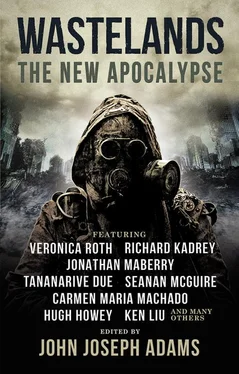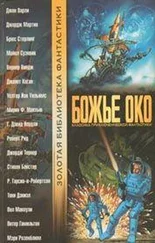This is my childhood bedroom. Huh. It’s not like I remember. The picture, I mean. I remember more mushrooms. It was violent almost. Like the mushrooms had forced their way in, like they had destroyed everything they touched. But in this, it looks like the mushrooms are all that’s holding the place together, like they were preserving it for me. Weird.
Anyway, I got a little emotional while I was there, and for the first time in a long time, I really remembered what it used to be like, before they came and tried to make this into their world. Not the story we told, but the real thing. All these little memories came flooding back all at once, so sharp and clear that it made the last couple decades of my life seem like a dream. It was the first time I felt like I was home in ages, and I almost couldn’t make myself leave. The air in that place was no good, and I didn’t have enough oxygen to stay for more than a couple hours.
Home. I had forgotten what home was. I think most of us had. I had remembered how much it hurt when it was taken away, but only now did I remember how great it was when I had it. In a way, that made it worse.
I decided I would go visit Shit Lake before I made my way out of the city. It wasn’t too far from my parents’ house. I never went to that park as a kid, but I knew where it was. I figured it would be nice to have a picture, and maybe it wouldn’t be the worst thing if I happened to catch Flynn. I still hadn’t decided whether I was mad at him or not, and I felt that another meeting would really help to clear things up.
So here’s the last picture I took of Flynn. He was just outside the park, lying in a gutter, bleeding from a big hole in his belly. He was already dead. Does he look like he’s sleeping? I wanted it to look like he was sleeping. I don’t know what got him. The city is dangerous, and he didn’t have a weapon.
“Superheroes aren’t real,” I whispered.
Did I cry? Maybe. The park had grown into a small forest, and the canopy was so thick it was almost too dark to see, even though the sun had barely set. Too dark to get a good picture.
I couldn’t lift Flynn’s body, but I could drag him, just barely. It was exhausting, and at times I thought it would be impossible, but I did it.
The lake was right there, in the middle of everything. And this will seem like the most sentimental of details, but sometimes real life is unlike itself: a bird with scales like polished fire was there, drinking. It couldn’t have been the same one I’d seen earlier, but I could not see a difference.
It reared back, spread its wings, then leapt at us. My gun was in my pack. I ought to have just run, but I didn’t. I wrestled with the damn thing, right over Flynn’s body. I had a mission. I had to complete it.
It pecked me, and I bled. All I could really do was swat at it and pull its feathers. I screamed, hoping to scare it. It just screeched back at me. I kept at it, louder and louder, and I wasn’t just screaming at it, I was screaming at everything. I don’t know if that was what did it, or if it just got tired of the whole thing, but it stepped back, slowly, and made its way back into the bush. I took just a moment for myself before grabbing Flynn again and pushing on.
The surface of the lake was covered in flowers, but it still stank like death. I took off my clothes, and I waded in, dragging Flynn with me. He floated at first, and it was a struggle to hold him down long enough for the air to escape his lungs. Up and down, up and down in the dirty water. I nearly drowned, I think.
But he sank soon enough, and I went down with him. The lake wasn’t very deep. I stayed down there as long as I could, until my lungs burned and I felt like I was going to die.
Here’s a picture of me after I came up, covered in mud and rotten leaves and God knows what. Sorry if it’s a little faded. I keep it on me all the time.
I went back to the camp after, back home, and things were what they were.
It’s important to remember these things, I think. That’s the magic of the image. The memories will lie, but I will always know that I am this person, someone strong and brave, and I will always possess the image, no matter how much things change.
Meg Elisonis a science fiction author and feminist essayist. Her debut novel, The Book of the Unnamed Midwife , won the 2014 Philip
K. Dick award. Her second novel was a finalist for the Philip K. Dick, and both were longlisted for the James A. Tiptree award. She has been published in McSweeney’s, Lightspeed, The Magazine of Fantasy & Science Fiction, Catapult , and many other places. Elison is a high school dropout and a graduate of UC Berkeley. Find her online, where she writes like she’s running out of time.
Turn the squeaky wheel of the old bingo cage and the crowd goes wild. Inside, tumbling around are pieces of garbage plastic: cups and spoons and faded balls from the play pit. All with names written or scratched on them. I open the cage door and reach in to pull the first contestant.
“Angie Becker, come on down!” She’s an old woman but she races at me anyway. She’s pumping her hands over her head and they quake something fierce, but her face is all smile lines.
I pull another piece of trash, this one a tin can with the name scratched into one end. “Tomtom, come on down!” Tomtom comes every day, but they didn’t expect to be picked and they’re not ready. They offload their weapons to some woman I’ve never seen before and then jog over, whooping like a hunter.
“Aaaaaand Luis Robles, come on down!” I pull something small for the last one. A spork. I’ve heard grumbling after the show that I never pull anything small. I pinch it between my fingers and pluck it triumphantly, holding it up like a bit of good luck. The ghost-taste of KFC rises in my unforgetting mouth and I banish it away.
Luis has seen better days. He’s got one hand in a crusty bandage. Red streaks are racing up his arm to see which gets to kill him first. But he’s steady on his feet, with eyes like wet steel.
“All right, who’s ready to play?” I have to pass the mic around. There’s no crew to wire us now, and no sound anyway. I remember watching Mack do the same thing on the old show. The smaller set, the one big mic. I’m glad I took one with me when we left L.A. It reminds them where to look. I bet it seemed stupid at the time, but I knew what I was doing. I don’t know how to use any other tool.
The crowd knows their job, too. Some of them do this every time we have a show. They break away from their group or make a trade and spend their noon to sundown here, hoping for a shot at showing their hollow belly when they reach up to spin the big wheel. The crowd’s job is to sing the music. It’s been the same jolly circus tune since the ’70s and they all know it. It’s ragtag and the tempo is all over the place, but they do it. And it all comes back to me.
The banter and the silliness. Sometimes they still jump up and down when they win.
The basic rules haven’t changed. The prices are still pegged to the local conditions, and the crowd still screams out their suggestions of what things should cost.
My showgirl Jessica opens the first case gesturing smoothly and grandly at three undented cans of boiled baby potatoes.
Angie’s jaw quivers and she crosses her shaking arms against her chest. “One pigeon and two dried apples.”
Tomtom is already shaking their head. “Pigeon. That’s all.”
Luis licks his lips and looks to the crowd. He came alone, but he’s everybody’s friend, now.
“PIGEON APPLE SHIRT METAL,” they holler in cacophony, one voice on top of the next. I don’t know how he gets anything from that, but he does.
Читать дальше


![Nick Cracknell - The Quiet Apocalypse [= Island Zero]](/books/28041/nick-cracknell-the-quiet-apocalypse-island-zero-thumb.webp)









